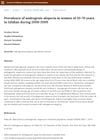 2 citations,
December 2016 in “Journal of Pakistan Association of Dermatology”
2 citations,
December 2016 in “Journal of Pakistan Association of Dermatology” Almost 40% of women aged 20-70 in Isfahan had hair loss, with it being more severe in those with low ferritin levels.
 115 citations,
January 2014 in “Journal of Cutaneous and Aesthetic Surgery”
115 citations,
January 2014 in “Journal of Cutaneous and Aesthetic Surgery” Platelet-rich plasma (PRP) is a cheap and easy treatment for hair loss, but not suitable for everyone. It also helps in healing ulcers, rejuvenating skin, and improving hair transplants.
 23 citations,
January 1994 in “Skin Pharmacology and Physiology”
23 citations,
January 1994 in “Skin Pharmacology and Physiology” Hair loss in men and women is linked to high stress hormone levels and other hormonal imbalances, suggesting treatments should be customized to each person's hormones.
[object Object]  1 citations,
January 2017 in “Journal of Community & Public Health Nursing”
1 citations,
January 2017 in “Journal of Community & Public Health Nursing” Wearing a cap doesn't affect quality of life for Indian men with hair loss, but severe hair loss does lower it. Older men have more severe hair loss, and those who wear caps more often want less treatment.
 January 2024 in “Journal of Education, Health and Sport”
January 2024 in “Journal of Education, Health and Sport” Platelet-rich plasma therapy shows promise in treating hair loss caused by androgenic alopecia.
 48 citations,
February 2014 in “Fertility and Sterility”
48 citations,
February 2014 in “Fertility and Sterility” Women with PCOS often have hair loss, which is linked to acne or excess body hair but not to worse hormone or metabolic issues.
 3 citations,
April 2018 in “Cosmetics”
3 citations,
April 2018 in “Cosmetics” As people get older, they have less active hair growth, but women have thicker hair than men and respond better to hair loss treatments.
 October 2010 in “Reproductive Biomedicine Online”
October 2010 in “Reproductive Biomedicine Online” Women with PCOS and androgenic alopecia have different triglyceride metabolism compared to those without hair loss.
February 2021 in “Медико-фармацевтический журнал "Пульс"” Understanding WNT signaling proteins can help predict and treat certain types of hair loss.
 November 2023 in “Journal of Drug Delivery Science and Technology”
November 2023 in “Journal of Drug Delivery Science and Technology” Exosomes may help stimulate hair growth and improve hair loss conditions like androgenic alopecia.
 1 citations,
May 2018 in “Journal of Evolution of medical and Dental Sciences”
1 citations,
May 2018 in “Journal of Evolution of medical and Dental Sciences” Platelet Rich Plasma (PRP) injections can effectively reduce hair loss and improve hair growth in both men and women suffering from androgenic alopecia.
 January 2023 in “Dermatologic Therapy”
January 2023 in “Dermatologic Therapy” The nutritional supplement Pilopeptan® WOMAN improved hair growth and thickness in women with hair loss.
 3 citations,
December 2019 in “Journal of Cosmetic and Laser Therapy”
3 citations,
December 2019 in “Journal of Cosmetic and Laser Therapy” PRGF treatments increased hair number and thickness in people with hair loss, with more injections leading to better results.
 16 citations,
November 1992 in “Journal of International Medical Research”
16 citations,
November 1992 in “Journal of International Medical Research” ViviScal®, a food supplement, was found to be highly effective in treating hereditary hair loss in young males, while fish extract showed no impact.
2 citations,
December 2018 in “Қазақстанның клиникалық медицинасы” Higher Vitamin-D levels may help treat certain types of hair loss.
September 2024 in “Fitoterapia” Camellia oleifera seed shell polyphenols and 1,3,6-tri-O-galloylglucose can help treat hair loss by reducing certain hormones and promoting hair growth.
 May 2012 in “15th International & 14th European Congress of Endocrinology”
May 2012 in “15th International & 14th European Congress of Endocrinology” Taking 1mg finasteride tablets for 6 months can lower good cholesterol (HDL) and raise triglycerides in men with hair loss.
 3 citations,
October 2021 in “Indian Journal of Plastic Surgery”
3 citations,
October 2021 in “Indian Journal of Plastic Surgery” Not all hair loss patients are suitable for hair transplant due to various conditions like unstable hair loss, insufficient hair loss, very young age, unrealistic expectations, certain psychological disorders, and medical unfitness.
 April 2019 in “Advances in Cosmetic Surgery”
April 2019 in “Advances in Cosmetic Surgery” The document concludes that ongoing medical therapy is crucial for preventing hair loss, and surgical options can restore hair, with future treatments for hair loss being promising.
 4 citations,
October 2021 in “Journal of family medicine and primary care”
4 citations,
October 2021 in “Journal of family medicine and primary care” In the Jazan region of Saudi Arabia, hair loss is common, especially among women, older people, and those with higher education and BMI. Stress, poor nutrition, and hormonal changes are key causes, but many don't seek medical help.
 July 2023 in “Journal of Ethnopharmacology”
July 2023 in “Journal of Ethnopharmacology” Amla fruit syrup improved hair growth and satisfaction in women with hair loss without significant side effects.
 December 2024 in “Revista Eletrônica Perspectivas da Ciência e Tecnologia - ISSN 1984-5693”
December 2024 in “Revista Eletrônica Perspectivas da Ciência e Tecnologia - ISSN 1984-5693” Polymeric nanoparticles could improve hair loss treatments by delivering drugs more effectively to hair follicles.
 January 2013 in “Российский журнал кожных и венерических болезней”
January 2013 in “Российский журнал кожных и венерических болезней” Androgenic alopecia, a common hair loss condition, is linked to changes in androgen metabolism and genetics, and can be treated with finasteride and minoxidil, but these treatments are only fully effective in 10% of patients.
 63 citations,
March 1995 in “International Journal of Dermatology”
63 citations,
March 1995 in “International Journal of Dermatology” Some drugs can cause hair loss, and stopping these drugs often leads to hair regrowth.
 35 citations,
January 2014 in “Postepy Dermatologii I Alergologii”
35 citations,
January 2014 in “Postepy Dermatologii I Alergologii” DHT's role in hair loss is important, but measuring its level for diagnosis is questionable.
 November 2024 in “Clinical Cosmetic and Investigational Dermatology”
November 2024 in “Clinical Cosmetic and Investigational Dermatology” Rosemary oil may effectively treat hair loss with fewer side effects, but more research is needed.
 January 2018 in “Archives of dermatology and skin care”
January 2018 in “Archives of dermatology and skin care” Mesotherapy for hair loss lacks strong evidence and clear guidelines for its effectiveness and product use.
[object Object]  14 citations,
December 2003 in “Medical Hypotheses”
14 citations,
December 2003 in “Medical Hypotheses” Male-pattern baldness might be caused by the effect of hormones on scalp blood vessels.

Certain drugs can worsen hair loss in people prone to androgenetic alopecia.
 January 2018 in “Elsevier eBooks”
January 2018 in “Elsevier eBooks” The document concludes that alopecia has significant social and psychological effects, leading to a market for hair loss treatments.



























